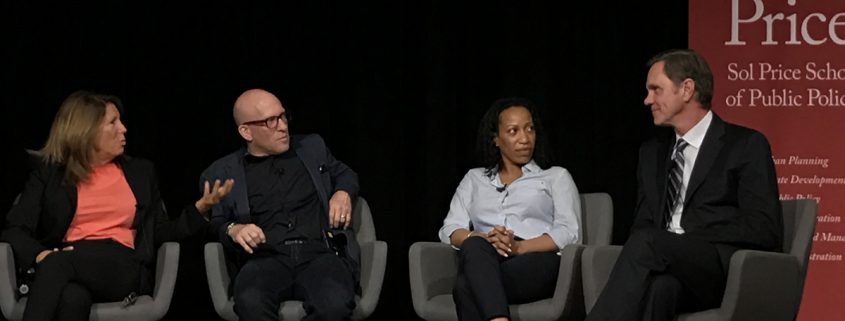Filmmakers discuss new docuseries
The lights dimmed in the auditorium as the film began to play. Actress Amy Poehler’s face filled the projector screen as she interviewed a California domestic worker on her experiences in the new docuseries America Divided, produced by panelists Norman Lear, Solly Granatstein, Mark Greenberg and Leah Natasha Thomas. The filmmakers met on Wednesday in the Annenberg Auditorium to discuss the EPIX original docuseries.
The panel featured Lear, Granatstein, Greenberg and Thomas, as well as Annenberg School for Communication and Journalism Dean Ernest Wilson III and Price School of Public Policy Dean Jack Knott. The panel was moderated by USC Schwarzenegger Institute for State and Global Policy Global Director Bonnie Reiss.
The directors began the panel by explaining what they hoped the docuseries would accomplish. Greenberg explained that, instead of trying to provide a clear solution to current-day problems, they wanted instead to provide a new and unique perspective about people’s lives and conditions instead.
“We were really trying to shed a light on what we saw as the critical issues plaguing society,” Granatstein said. “We weren’t trying to prescribe a solution because the issues are complicated. Instead, this project’s purpose was to show that the first part of bridging the gap is trying to understand the other side.”
Lear recalled his astonishment at learning Brooklyn’s low-income living conditions in comparison to the million-dollar apartments across town.
“I had no idea that I would be so profoundly disturbed and informed from this project,” Lear said. “It isn’t until you’re standing in a $1.2 million apartment, learning that it was bought with money that was parked there by faceless international millionaires; and then later in the afternoon you’re sitting with 50 tenants who are being forced out by landlords who are doing everything they can to get them out there that you realize just the magnitude of the inequity in this country.”
Having finished the production for the first season of America Divided, panelists reflected on the current political climate. Although most of them agreed that the average welfare of the American citizen has improved over the past decades, they also agreed that the country is now more divided than it was before.
“The divide is deep, and it’s multifaceted,” Greenberg said. “And part of it is from people who feel left out, feel left behind, are angry and have decided to express that by voting for a conservative candidate. The other part is from people who feel left out, unheard, have lost hope in our political system and have as a result given up on voting. And because of that we have a gap in communication, in understanding.”
Moving forward, Lear and Greenberg offered myriad proposals to unite the country. Two of them included increased communication and increased empathy.
“What we’re doing here, causing conversation, is so important,” Lear said. “To look at this film and see and learn isn’t enough. To look at it and talk to someone and get the conversation going is critical to bridge the divide.”
Wilson explained that empathy sounds simple and cliche, but in reality it is difficult to achieve.
“One of the reasons we’re so divided politically is that we’re so stuck in our own pain, that we’re so stuck in our grievances that we really can’t deal with other people’s pain,” Wilson said. “And we tend to think of empathy as passive. But lately after having conversations with activists, I realized it takes a kind of courage to be empathetic.”

